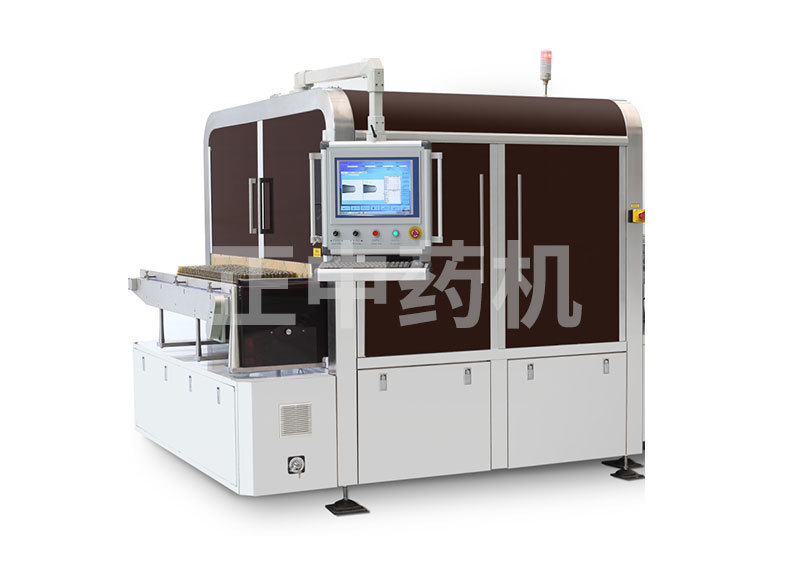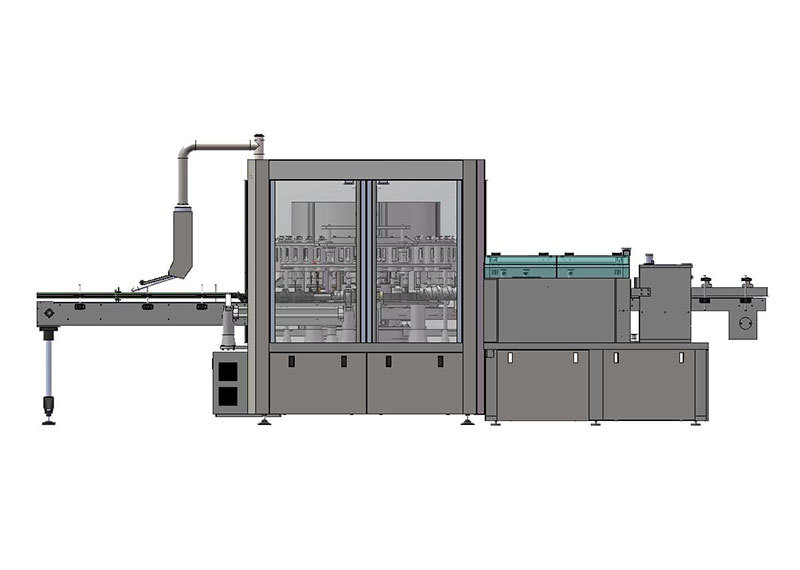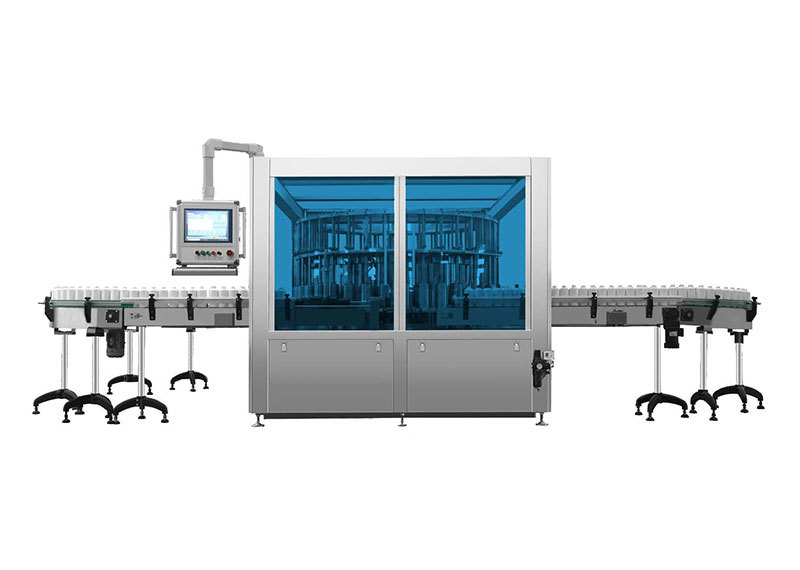Product Center
-
● Automatic inspection machine for particulate matter in ampoules
-
● Automatic inspection machine for oral liquid foreign objects
-
● Automatic inspection machine for lyophilized preparations in vials
-
● Automatic foreign object inspection machine for plastic bottle intravenous infusions
-
● Electronic microporous leak detector for ampoule injections
-
● Fully automatic electronic microporous leak detector for infusion
-
● Automatic foreign object inspection machine for glass bottle intravenous infusions
-
● In-line plastic ampoule electronic micro-hole leak detector
JAZ20/600X Glass Bottle Oral Liquid Automatic Foreign Object Inspection Machine
Mainly engaged in the research and development of ceramic new material valves, with metal valves (gate valves, globe valves, ball valves, butterfly valves) as a secondary business. Ceramic valves have been successfully applied in many new energy battery material plants, thermal power plants, nuclear power plants, chemical plants, steel plants, coal chemical industry, polysilicon and other industries, and have been listed as special-purpose products, contributing to energy conservation and environmental protection for enterprises and society.
Category
Automatic foreign object inspection machine for glass bottle intravenous infusions

Details
Main Uses
Primarily used for detecting visible foreign particles (including glass shards, fibers, hair, white clumps, white spots, etc.), liquid levels, and charred ends (optional) in ampoule injectables.
How it works
This machine utilizes the principle of machine vision: after the product being inspected rotates at high speed, it is brought to a controlled stop. An industrial camera then continuously captures images, which are subsequently analyzed by a computer system to determine whether the product meets quality standards—and automatically sorts out合格品 (qualified products) from 不合格品 (non-qualified products).
Process Flow
Product awaiting inspection → Bottle feeding → Bottle-feeding indexing wheel (for inspecting large glass containers) → Bottle pressing and clamping → Bottle spinning → Braking → Image capture → Image processing and analysis → Bottle ejection → Separation of合格品 (qualified products) and 不合格品 (non-qualified products)
Main Technical Parameters
Applicable scope: 1–20 ml ampoules, aqueous injections, etc.
Testing items: Visible foreign objects (glass shards, fibers, hair, white particles, white spots, etc.), liquid level, and charred ends (optional).
Detection speed: 600 bottles per minute
Detection accuracy: 40 μm (adjustable)
Capacitance: 9.5 kW
Voltage: 380V, 50Hz
Workbench height: 925mm
External dimensions: 2575mm × 2475mm × 2000mm (Length × Width × Height)
Net weight: Approximately 3,500 kg
Key Features
- The entire machine features a newly designed, patented technology with an innovative and more rational structure, ensuring stable operation and convenient maintenance.
- The entire machine features full servo drive, ensuring more precise transmission and making operation and adjustment even more convenient.
- It employs the internationally recognized top-and-bottom clamping bottle-holding method, along with a patented rotary bottle-driving mechanism that ensures both stable bottle gripping and consistent rotation speed—while also making cleaning and maintenance more convenient.
- There is a specially designed large glass inspection station.
- The rotary bottle servo system and the detection device are both mounted on the tabletop, which completely isolates the underlying transmission mechanism. This design ensures convenient and straightforward operation and maintenance, making it easy to clean without causing any contamination to the equipment.
- All specification parts feature a quick-change loading and unloading system, while the large plate uses servo-driven automatic lifting for even faster replacement of components.
- Using a screw conveyor for bottle feeding ensures seamless coordination when the machine is connected in a front-to-back line.
- It features multiple fault alarms and protection functions; when a malfunction occurs or improper operation takes place, the machine will either sound an alarm or shut down, while simultaneously displaying the cause of the failure.
- All test data can be saved, uploaded, and printed.
Mainly engaged in the research and development of ceramic new material valves, with metal valves (gate valves, globe valves, ball valves, butterfly valves) as a secondary business. Ceramic valves have been successfully applied in many new energy battery material plants, thermal power plants, nuclear power plants, chemical plants, steel plants, coal chemical industry, polysilicon and other industries, and have been listed as special-purpose products, contributing to energy conservation and environmental protection for enterprises and society.
Main Uses
Primarily used for detecting visible foreign particles (including glass shards, fibers, hair, white clumps, white spots, etc.), liquid levels, and charred ends (optional) in ampoule injectables.
How it works
This machine utilizes the principle of machine vision: after the product being inspected rotates at high speed, it is brought to a controlled stop. An industrial camera then continuously captures images, which are subsequently analyzed by a computer system to determine whether the product meets quality standards—and automatically sorts out合格品 (qualified products) from 不合格品 (non-qualified products).
Process Flow
Product awaiting inspection → Bottle feeding → Bottle-feeding indexing wheel (for inspecting large glass containers) → Bottle pressing and clamping → Bottle spinning → Braking → Image capture → Image processing and analysis → Bottle ejection → Separation of合格品 (qualified products) and 不合格品 (non-qualified products)
Main Technical Parameters
Applicable scope: 1–20 ml ampoules, aqueous injections, etc.
Testing items: Visible foreign objects (glass shards, fibers, hair, white particles, white spots, etc.), liquid level, and charred ends (optional).
Detection speed: 600 bottles per minute
Detection accuracy: 40 μm (adjustable)
Capacitance: 9.5 kW
Voltage: 380V, 50Hz
Workbench height: 925mm
External dimensions: 2575mm × 2475mm × 2000mm (Length × Width × Height)
Net weight: Approximately 3,500 kg
Key Features
- The entire machine features a newly designed, patented technology with an innovative and more rational structure, ensuring stable operation and convenient maintenance.
- The entire machine features full servo drive, ensuring more precise transmission and making operation and adjustment even more convenient.
- It employs the internationally recognized top-and-bottom clamping bottle-holding method, along with a patented rotary bottle-driving mechanism that ensures both stable bottle gripping and consistent rotation speed—while also making cleaning and maintenance more convenient.
- There is a specially designed large glass inspection station.
- The rotary bottle servo system and the detection device are both mounted on the tabletop, which completely isolates the underlying transmission mechanism. This design ensures convenient and straightforward operation and maintenance, making it easy to clean without causing any contamination to the equipment.
- All specification parts feature a quick-change loading and unloading system, while the large plate uses servo-driven automatic lifting for even faster replacement of components.
- Using a screw conveyor for bottle feeding ensures seamless coordination when the machine is connected in a front-to-back line.
- It features multiple fault alarms and protection functions; when a malfunction occurs or improper operation takes place, the machine will either sound an alarm or shut down, while simultaneously displaying the cause of the failure.
- All test data can be saved, uploaded, and printed.
Related Products
Inquiry



